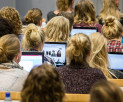Not all lectures online
More than 300,000 euros was invested last year in recording equipment for lecture halls. In total, fifteen large lecture halls were made ready for video lectures.
‘It’s recording equipment that teachers can easily turn on and off. The recording can also be scheduled to start automatically’, says Tjeerd Willem Hobma, managing director of the University’s IT department. The recordings are automatically stored in Nestor so that teachers can easily make them available to students.
But that does not mean that all lectures will soon be available online, say Hobma. ‘The faculties and individual teachers themselves get to decide what they offer.’ And not every faculty or teacher sees the benefits of video lectures. They are often worried that students will no longer attend any lectures when they can also watch them at home on their laptops.
Great interest
That is an unfair assumption, according to SOG’s party leader Alexander van ‘t Hof. ‘We conducted a survey last year among multiple faculties, and that revealed that the vast majority of the students still attend lectures in person and watch the video lectures either if they were not able to attend them or to review them for clarification while studying for their exams. The fear that instructors have of lecture halls being empty is therefore unfounded.’
There is great interest in online lectures among students, according to student faction Lijst Calimero and SOG. Earlier this year, they wrote a memorandum to the Board of the University. ‘Students make use of [the video lectures] when they are studying for their exams to help with the material discussed. But for some students, viewing recorded lectures will always remain a dream that doesn’t come true while they’re studying’, according to Lijst Calimero.
The factions would like all lectures to be made available online and for a clear policy to be formulated about when the videos are made available. But rector Elmer Sterken is not yet convinced. ‘I’m against automatically recording without the instructor’s knowledge. We have to record with a goal in mind and that goal is decided on by the teacher’, he said earlier.
Exciting
Sterken would rather focus on e-learning: the use of digital tools during lectures. ‘Recording video lectures doesn’t always fit within that framework, but we can specifically use it to prepare students for a lecture in which a discussion will take place.’
Hobma also thinks the technique should be used to make education exciting and innovative, so students can actively participate in the lectures. ‘New IT solutions have enabled students to indicate beforehand what they think a teacher should address during the lecture. And there are also methods where students can answer a teacher’s questions during the lecture, or to vote. The teacher can then go over these answers during the lecture. As you can see, there is a myriad of solutions to improve the quality of education and make it more attractive.’






